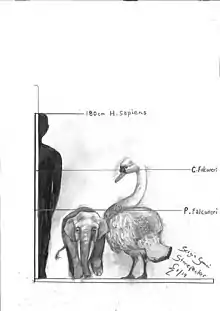Cygnus falconeri
Cygnus falconeri, the giant swan, (Maltese: Ċinju ġgant) is an extinct, very large swan known from Middle Pleistocene-aged deposits from Malta and Sicily. Its dimensions are described as exceeding those of the living mute swan by one-third,[2] which would give a bill-to-tail length of about 190–210 cm (based on 145–160 cm for C. olor[3]). By comparison to the bones of living swans, it can be estimated that it weighed around 16 kg and had a wingspan of about 3 m. It would have been taller, though not heavier, than the region's dwarf elephants. Due to its size, it may have been flightless.[4] It became extinct before the increase in human activity in the region (see Holocene extinction event), so its disappearance is thought to have resulted from extreme climate fluctuations or the arrival of superior predators and competitors.[5] Its bones are exhibited at Għar Dalam museum in Birżebbuġa, Malta.
| Giant swan | |
|---|---|
 | |
| Reconstruction of Cygnus falconeri with Palaeoloxodon falconeri and a human for scale | |
| Scientific classification | |
| Kingdom: | Animalia |
| Phylum: | Chordata |
| Class: | Aves |
| Order: | Anseriformes |
| Family: | Anatidae |
| Genus: | Cygnus |
| Species: | C. falconeri |
| Binomial name | |
| Cygnus falconeri | |
References
- Parker, W. K. (1865). "Preliminary notes on some fossil birds from the Zebbug Cave, Malta". Proceedings of the Zoological Society of London. 1865: 752–753 – via Biodiversity Heritage Library.
- Heilprin, Angelo (1974). The Geographical and Geological Distribution of Animals (reprint ed.). New York: Ayer Publishing. p. 333. ISBN 0-405-05742-3.
- Snow, D. W.; Perrins, C. M. (1998). The Birds of the Western Palearctic (Concise ed.). OUP. ISBN 0-19-854099-X..
- Antoni, Josep (May 30, 2000). "Vertebrate Evolution and Extinction on Western and Central Mediterranean Islands". Tropics (10): 103–123. Archived from the original on 2006-04-18.
- Thake, M. A. (May 1985). "The Biogeography of the Maltese Islands, Illustrated by the Clausiliidae". Journal of Biogeography. 12 (3): 275. doi:10.2307/2844999. JSTOR 2844999.